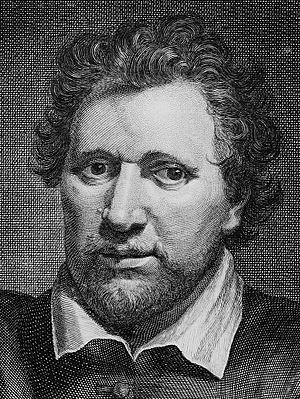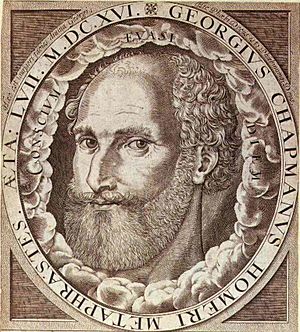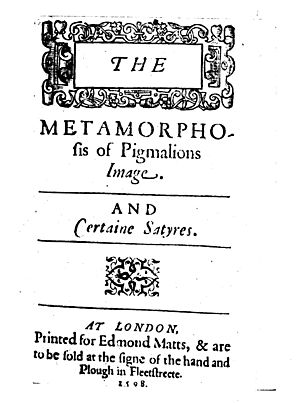John Marston (playwright) facts for kids
John Marston (born 1576 – died 1634) was an English writer. He wrote plays, poems, and funny stories called satires. He lived during the late Elizabethan and early Jacobean times. His writing career lasted only about ten years. People remember his work for its strong and sometimes tricky style. He also helped create a special writing style for the Jacobean period.
Contents
John Marston's Life Story
Marston was born to John and Maria Marston. He was baptized on October 7, 1576, in Wardington, Oxfordshire. His father was a well-known lawyer in London. He later became a legal advisor for the city of Coventry.
School and Early Days
John Marston went to Brasenose College, Oxford, in 1592. He earned his first degree in 1594. By 1595, he was living in London. He was part of the Middle Temple, a place where lawyers trained. He liked poetry and writing plays. However, his father hoped he would stop these "vanities." In 1605, he married Mary Wilkes. Her father, William Wilkes, was a chaplain for King James I.
Starting as a Writer
Marston's short writing career began with popular types of poetry. These included long poems about heroes and funny, critical poems called satires. In 1598, he published a book of poems. It was called The Metamorphosis of Pigmalion's Image and Certaine Satyres. This book was inspired by old Roman writers like Ovid and Juvenal.
He also published another book of satires in 1598. It was called The Scourge of Villanie. Marston used the pen name "W. Kinsayder" for these satires. His satires were very harsh and critical, even for that time. Marston believed that satires should be rough and hard to understand. He thought this because the word 'satire' might have come from ancient Greek 'satyr plays'.
Marston seemed angry that another writer, Joseph Hall, claimed to be the first English satirist. Marston made fun of Hall in some of his satires. Some people think that William Shakespeare's characters like Thersites and Iago were influenced by Marston's The Scourge of Villanie.
However, the popularity of verse satire was soon stopped by censors. The Archbishop of Canterbury John Whitgift and the Bishop of London Richard Bancroft banned Marston's Scourge. They had it publicly burned on June 4, 1599. Other satirists' works were also burned that day.
Writing Plays for Philip Henslowe
In September 1599, John Marston started working as a playwright for Philip Henslowe. Some people thought he turned to plays because of the ban on satires. But others say the ban wasn't very strict. Marston turned out to be a good fit for the stage. He wrote for "private" playhouses. These were smaller theaters where boy players performed plays for a fancy audience.
His first play is usually thought to be Histriomastix. It was performed around 1599. This play seemed to start the "War of the Theatres." This was a literary feud between Marston, Ben Jonson, and Thomas Dekker. It happened between 1599 and 1602. Around 1600, Marston wrote Jack Drum's Entertainment and Antonio and Mellida. In 1601, he wrote Antonio's Revenge, which was a follow-up to Antonio and Mellida. All three plays were performed by a company at St. Paul's Cathedral. In 1601, he also wrote poems for Robert Chester's Love's Martyr.
His Feud with Ben Jonson

By 1601, Marston was well-known in London's writing world. He was especially known for being an enemy of the equally strong-willed Ben Jonson. Jonson said Marston was a fake poet. He called him a vain, careless writer who copied others. Jonson also said Marston's own works had strange words and ugly new terms.
Marston, for his part, may have made fun of Jonson in his plays. He might have shown Jonson as the proud critic Brabant Senior in Jack Drum's Entertainment. He might also have shown him as the jealous writer Lampatho Doria in What You Will.
Jonson even claimed that their fight went beyond words. He said he once beat Marston and took his pistol. However, the two writers became friends again soon after this "War of the Theatres." Marston wrote a poem for Jonson's play Sejanus in 1605. He also dedicated his play The Malcontent to Jonson. Yet, in 1607, Marston criticized Jonson again. He said Jonson was too focused on rules to understand his audience or art.
Working at Blackfriars Theatre
Outside of these arguments, Marston's career kept growing. In 1603, he became a part-owner in the Children of Blackfriars company. This company was known for pushing the limits of what they could say about people on stage. He wrote and produced two plays with this company.
His first play there was The Malcontent in 1603. This funny and sad play is Marston's most famous work. It was first written for the children's company at Blackfriars. Later, another company, the King's Men, performed it at the Globe Theatre. They added parts by John Webster and maybe Marston himself.

In 1605, Marston worked with George Chapman and Ben Jonson. They wrote a play that made fun of people who dreamed of getting rich in Virginia. Chapman and Jonson were arrested for some lines that offended the Scottish people. But Marston managed to avoid jail. We don't know for sure why they were arrested or the exact details. The charges were eventually dropped.
In 1606, Marston seemed to upset King James. First, in his play Parasitaster, or, The Fawn, he made fun of the king directly. In 1607, he wrote The Entertainment at Ashby. This was a special show for the Earl of Huntingdon. After this, he stopped his playwriting career completely. He sold his shares in the Blackfriars company.
His leaving the writing scene might have been because of another play. This play is now lost. It also offended the king. The French ambassador complained to King James about how French royalty was shown in plays by Chapman at Blackfriars. King James was angry. He stopped performances at Blackfriars and had Marston put in prison. This suggests Marston wrote the play that caused the trouble.
Later Life and Legacy
After his writing career ended, John Marston moved into his father-in-law's house. He started studying philosophy. In 1609, he became a reader at the Bodleian Library at Oxford. He became a deacon on September 24 and a priest on December 24, 1609. Other writers of his time were surprised by Marston's sudden change of career.
In October 1616, Marston was given a church job in Christchurch, Hampshire. He died on June 24, 1634, at age 57, in London. He was buried in the Middle Temple Church.
Tombs back then often started with "Memoriae Sacrum" (meaning "Sacred to the memory"). This was followed by the person's name and their achievements. But John Marston's tombstone had a different message. It said "Oblivioni Sacrum" (meaning "Sacred to Oblivion"). Marston probably wrote this himself. It was a humble and clever way to turn the usual tomb message upside down.
Selected Works
Plays and when they were first performed
- Histriomastix, 1599
- Antonio and Mellida, London, Paul's theatre, 1599–1600.
- Jack Drum's Entertainment, London, Paul's theatre, 1599/1600.
- Antonio's Revenge, London, Paul's theatre, 1600.
- What You Will, London, Paul's theatre, 1601.
- The Malcontent, London, Blackfriars Theatre, 1603–1604; Globe Theatre, 1604.
- Parasitaster, or The Fawn, London, Blackfriars theatre, 1604.
- The Wonder of Women, or The Tragedy of Sophonisba, London, Blackfriars theatre, 1606.
- The Spectacle Presented to the Sacred Majesties of Great Britain, and Denmark as They Passed through London, London, July 31, 1606.
- The Entertainment of the Dowager-Countess of Darby, Ashby-de-la-Zouch in Leicestershire, 1607.
- The Insatiate Countess, by Marston and William Barksted, London, Whitefriars Theatre, 1608?.
Books
- The Metamorphosis of Pigmalions Image. And Certaine Satyres (London: Printed by J. Roberts for E. Matts, 1598).
- The Scourge of Villanie. Three Bookes of Satyres (London: Printed by J. Roberts & sold by J. Buzbie, 1598; revised and enlarged edition, London: J. Roberts, 1599).
- Jacke Drums Entertainment: Or, The Comedie of Pasquill and Katherine (London: Printed by T. Creede for R. Olive, 1601).
- Loves Martyr: or, Rosalins Complaint, by Marston, Ben Jonson, William Shakespeare, and George Chapman (London: Printed for E. B., 1601).
- The History of Antonio and Mellida (London: Printed by R. Bradock for M. Lownes & T. Fisher, 1602).
- Antonios Revenge (London: Printed by R. Bradock for T. Fisher, 1602).
- The Malcontent (London: Printed by V. Simmes for W. Aspley, 1604).
- Eastward Hoe, by Marston, Chapman, and Jonson (London: Printed by G. Eld for W. Aspley, 1605).
- The Dutch Courtezan (London: Printed by T. Purfoote for J. Hodgets, 1605).
- Parasitaster, or The Fawne (London: Printed by T. Purfoote for W. Cotton, 1606).
- The Wonder of Women, or The Tragedie of Sophonisba (London: Printed by J. Windet, 1606).
- What You Will (London: Printed by G. Eld for T. Thorppe, 1607).
- Histriomastix: Or, The Player Whipt (London: Printed by G. Eld for T. Thorp, 1610).
- The Insatiate Countesse, by Marston and William Barksted (London: Printed by T. Snodham for T. Archer, 1613).
- The Workes of Mr. J. Marston (London: Printed by A. Mathewes for W. Sheares, 1633); republished as Tragedies and Comedies (London: Printed by A. Mathewes for W. Sheares, 1633).
- Comedies, Tragi-comedies; & Tragedies, Nonce Collection (London, 1652).
See also
 In Spanish: John Marston (poeta) para niños
In Spanish: John Marston (poeta) para niños
 | Calvin Brent |
 | Walter T. Bailey |
 | Martha Cassell Thompson |
 | Alberta Jeannette Cassell |


